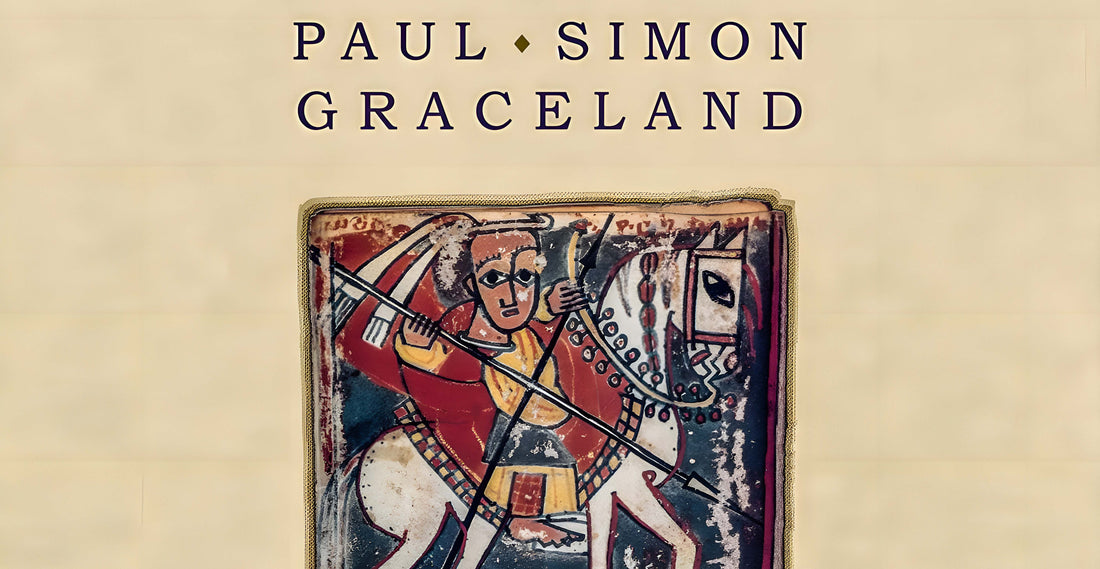
Paul Simon: A Legendary Musician's Journey to Graceland and Beyond
Share
You would only have to dip your toes into the river of iconic musicians to uncover the genius of Paul Simon. A name that resonates deeply within the music industry. Paul Simon’s career took off in the ’60s when he formed the duo Simon & Garfunkel, with a grade school friend, Art Garfunkel. Together, they produced timeless hits such as “The Sound of Silence” and “Mrs. Robinson,” beguiling millions. After the duo disbanded, due to halting creative differences (and Garfunkel’s dreams of becoming a movie star), Simon ventured into a solo career that crystallized his status as a musical genius. Paul Simon’s notable solo works, including albums like Graceland, Still Crazy After All These Years, and The Rhythm of Saints, showcased his exceptional songwriting capabilities and innovative musical style.
Although Simon’s ventures into Africa were shadowed by some criticism for “appropriating the music of another culture,” and during the height of the abhorrent Apartheid, the subsequent album, Graceland, was not only a remarkable success, but I consider it to be one of (probably within the top ten) greatest albums of all time. I’m not one for associating the art that someone might make with a person’s behaviors or sociopolitical ideals; in part, because if you’re in the public eye for long enough, you will inevitably do something to offend someone. Released in 1986, Graceland, a fusion of American folk rock and African rhythms, revolutionized the music scene and has enchanted listeners worldwide for decades. The album’s title track, “Graceland,” along with songs like “Diamonds on the Soles of Her Shoes,” and “You Can Call Me Al,” summarize the artistic brilliance and cultural exploration of Paul Simon, as well as a world of African music otherwise unknown to American audiences.
I have a hard time understanding how cultural appropriation applies to music. Music is and has always been inclusive, and enjoying and exploring the music of other cultures, even the fusion of music, is a celebration of life. The fact that many of us are actively looking for ways to exclude or polarize ideology, but music especially is disturbing to me (and, also because we’re almost all behaviorally contorted, depending on perspective, cultural misreading, and our own experiences, and if this was true in the mid ‘80’s when Graceland was released, imagine how true it is of today?). Graceland is a timeless masterpiece, and it’s because of the collaboration of songwriters like Joseph Shabalala, Youssou N’Dour, Forere Motloheloa, General MD Shirinda, Lulu Masilela, and Johnson Mkhalali, along with more than three dozen African musicians.
Paul Simon’s evolution as a musician, from his humble beginnings to his groundbreaking album Graceland, has created a mosaic of the alchemizing power of music, and his legacy continues to inspire and captivate me, and millions of supporters worldwide. Curing the legend of Paul Simon in the world of music. I can’t even imagine the world without Paul Simon, the songs of Graceland, and the influence he and his music have had on music and listeners. There is so much about the music scene today that we owe to Paul Simon, including his mainstream introduction to African music, which has been deeply and personally profound for me.
Paul Simon’s remarkable journey and groundbreaking music have unquestionably made an impression on music. His fearless exploration of diverse cultures and genres has inspired generations of musicians and fans and will continue to. Graceland, in particular, remains a testament to the power of music to bridge cultural divides and create something truly extraordinary. As we continue to navigate the complexities of cultural exchange and appropriation, Paul Simon’s legacy is a memento of music and a reminder that, at its core, music is a universal language that can unite us all. We should celebrate the enduring legacy of Paul Simon, a true icon in music, and continue to find inspiration in the beauty and diversity of music worldwide.